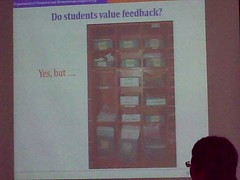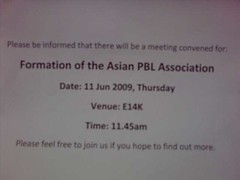Which is why I signed up for this conference:

Just ended Day-1 of the three-day symposium, held at Republic Polytechnic. I didn't have any specific expectations of the symposium. My main aim was to get some insights on Problem Based Learning (PBL). To get a feel of the trends and what educators are thinking/ doing.



When I attended RICE 2008, I'd heard PBL (or its equivalent) mentioned a few times. That got me wondering how public libraries can be part of the equation.
PBL isn't directly related to public libraries. But seems to me there's potential. Not necessarily in the form employed in schools today.
One of the speakers today, Dr. Mark A. Serva, cited this Wikipedia entry when he mentioned PBL. Incidentally, the Wikipedia entry cites a few of the references and citations I'd heard from Day-1.
Here are my Tweets from Day-1, in sequential chronological order (Twitter hashtag #pbl09w):
MOE perm sec says: Polytechnics in SG takes in 40% of student cohort.
key PBL components: Problem, Facilitation, Collaboration, Reflection
keynote speaker: despite wide use, PBL has limited evidence base. Mixed results.
I'm thinking: if measures of PBL are not 100% conclusive, what then to devise new ways to measure impact of libraries & reading?
from my layman understanding of PBL, the key may be the facilitator rather than method (PBL).
now attending workshop on "assessing student learning". Am interested in applying to library context.
"assessment (i.e. feedback), rather than teaching, has a major influence on students' learning"
suggestion that educators prefer to teach than assess. Conversely students want to know how they fare rather than learn
"assess" is from latin "assidere", i.e "to sit with".
trainer: "learning objectives were only introduced in 2001 in my uni. Yours?". Participant:"we've had them but no one verifies"
my take from this workshop: even educators are asking if their assessment methods are valid or the best.
seems there's no one best assessment method. Depends on what's practical, logical, acceptable (by parents/ students/ mgt)
it occurred to me my conference Tweets are a way to assess speaker & also my learning. So... Give students Twitter?
"a good assessment protects privacy and dignity of those being assessed"
hawk & hill (2001) if you are giving grades, students don't care for comments. hmm.
strategy of "union of insufficiencies" of assessment methods. a variety of assessment methods help give better picture.
Now listening to Mark A. Serva "holistic view of student learning: moving beyond pedagogy
dr. mark Serva "the goal is Learning, not Teaching... MacDonalds' goal isn't to make hamburgers; it's to make ppl happy"
dr. Serva: "integration of writing is critical for learning". He hopes to get students to write their textbook.
Formative Assessment aims to give feedback to student for chance to improve. Not just Summative Assessment
ooh, I'm at this workshop where there's a quietly hostile participant! Challenging the speaker.
Recurrent theme: each assessment method has strength & weakness. Strategy is to use various methods to assess diff aspects.
suggestion that educators should ultimately make professional judgement on student, & not just rely on assessment tools only
idea that educators can subjectively judge student performance but justify w evidence from various assessments (sounds like real world staff appraisals!)
[Next: Part 2]

Hi there, just some responses to some of the points made.
ReplyDelete1. The issue of how to assess has been debated by educators for decades and decades and decades. As you mentioned, the assessment tool used depends a lot on circumstance and its purpose (e.g. give feedback, stream students).
2. PBL as carried out by RP is not practical in govt sec schools because of time-tabling issues. In RP, students solve one problem in a full day's lesson. In sec school, one lesson is 40min - 90min.
3. In the case of medical students, they are not only motivated, they also come with pretty good background knowledge already. PBL, like case studies, would be useful to see how they apply the knowledge. It's less convincing with secondary school students who are still picking up fundamentals. Some teachers would argue that you'll need to scaffold the learning, rather than let the students wander randomly in a field they know little about.
4. For youth librarians to apply PBL... One catch is that the teenagers are used to other styles of learning (e.g. short, structured group work), you prob need to have enough time with them so that they can first get used to the method (i.e. "unlearn" their unconscious expectations based on what usually happens in class), before they can make effective use of it.
5. Locally, some of the more widely used/applied theories/models, are, I think: multiple intelligences, learning styles, de bono's, socratic questioning, "think-pair-share", role-plays & dramatization. (Sorry for rattling on for such a list, some or even all might be very familiar to you already.)
Hi Wen Sze, you've made very good points. Sounds like you know more about PBL than me :) The conference was an eye-opener for me. I attended a mock tutorial and will be blogging about my experience. In a later post. Thanks for your comment!
ReplyDeleteWill be interesting to hear about your tutorial experience. :) I sometimes wonder why symposiums on new pedagogies are often conducted almost entirely in lecture-seminar styles...
ReplyDeleteI've a friend teaching at RP, and we had a couple discussions on the pros and cons of PBL. Our main conclusion was that you need different methods for different teaching contexts (which is a point MOE tried to make in its PETALS model that most teachers know about but usually only in theory, hehe).
>>>
ReplyDeleteI sometimes wonder why symposiums on new pedagogies are often conducted almost entirely in lecture-seminar styles...
>>>
Because lectures and talks are one of the most efficient ways to deliver information. This much was acknowledged by one of the speaker.
My own understanding is that PBL isn't the catch-all for all learning situations. If we're just aiming for up to 2nd Level of Bloom's Taxonomy, lectures would suffice, imho.